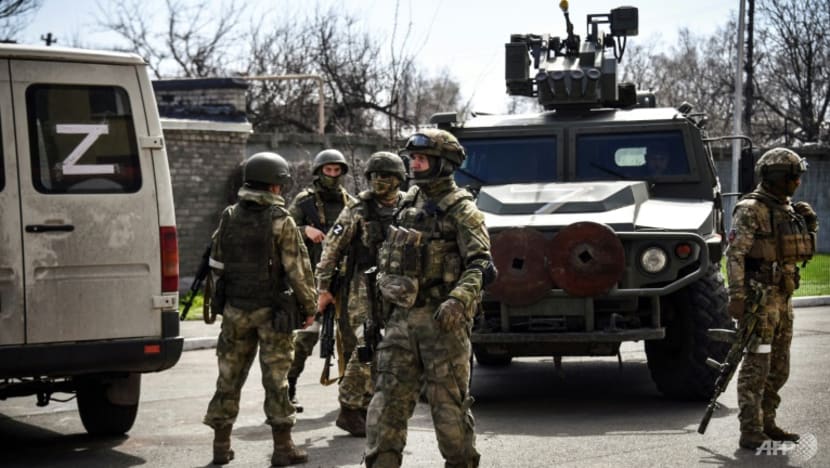Commentary: What happens when soldiers in Russia trigger missile strikes far away in Ukraine?
Going quietly unnoticed in the Ukraine war are the soldiers who execute missile strikes all the way from Russia, but being distanced from the conflict on the ground might not spare them the psychological burden of their duties, writes the Financial Times' Gillian Tett.

Russian soldiers patrol a street on April 11, 2022, in Volnovakha in the self-proclaimed Donetsk People's Republic. (Photo: AFP/Alexander NEMENOV)
LONDON: Three decades ago, the Canadian anthropologist Hugh Gusterson embedded himself among United States nuclear weapons scientists at a research facility in California with the aim of understanding what makes them tick.
“When you think of anthropologists, you [normally] think of people who study cannibals in New Guinea,” Gusterson said in a 2016 TED talk. “I wanted to know why someone, when they graduate from university, would want to give the rest of their life to designing weapons that could kill millions of people, what it feels like to do that for a living.”
Gusterson’s findings are distinctly timely now, as the war in Ukraine continues. What he discovered, after living in this shadowy world for a couple of years, was that weapons scientists’ worldviews were distinctly different from what he expected.
NOT RIGHT-WING POLITICAL IDEOLOGUES
“I assumed [they] would be right-wing Republicans. I was wrong,” he recalled. “More of them were liberal. Many had been active in the civil rights movements… they gave to environmental causes. And about 70 per cent of the scientists I spoke to were active Christians.”
“They weren’t political ideologues… they did it out of a kind of pragmatic sense,” he added. More specifically, the scientists thought “nuclear weapons keep the peace… that they were making devices that just pragmatically forced countries to behave themselves and not attack each other”.
This might seem bizarre to some. But Gusterson’s story reveals two important points: First, it is always dangerous to presume that we know the internal logic driving others.
And, second, insofar as modern warfare involves all manner of different professions and specialisations, we do not always pay enough attention to the lesser-known ones.
MILITARY DECISIONS ARE MADE HUNDREDS OF KILOMETRES AWAY FROM UKRAINE
In recent weeks, the media has extensively covered Russian soldiers on the front lines of the assault on Ukraine. An army of citizen journalists has been using smartphones to record atrocities as well as the more mundane details of life in the war-torn country.
Meanwhile, Ukrainian intelligence teams, volunteer hackers and online investigators, such as Bellingcat, have intercepted Russian social media communications and hacked into government databases, publishing their findings online. The net result has been an unprecedented real-time glimpse into what is shaping this kinetic war.
This is not only astonishing, but it also enables investigators to gather material for war crime prosecutions. However, as the Bellingcat researchers know only too well, the focus on Russian soldiers inside Ukraine tells only part of the tale.
Consider the issue of missile strikes. Until recently, I assumed that the munitions hitting Ukraine were being dispatched from locations near the targets.
However, the Bellingcat team tells me that they have recently drilled into public and private Russian databases and determined that many of the military staff who are programming the strikes are sitting in places as far away as St Petersburg.
Until now, these individuals have been almost entirely anonymous since their units operate under false names. But over the coming days, Bellingcat plans to publish the names of these remote missile pilots in a bid to more accurately represent who is really prosecuting this war.
WHAT ARE REMOTE MISSILE PILOTS THINKING?
This is a salutary exercise not least because it underscores the changing nature of war in the 21st century. And it leaves me with questions: What do these remote Russian pilots think about their jobs? Do they, like American nuclear scientists, find soothing ways to rationalise their mission? How do they handle the contradictions?
Anthropologists have already asked these questions about American soldiers who are working with drones and robots.
In his book War Virtually, published this month, Roberto J Gonzalez recounts the fact that some US military staff members were so suspicious of these machines that teams of psychologists were brought in to counter this “trust issue”, while other units had become so deeply attached to their robots that they gave them tattoos and even held funerals when they “die” (broke down).
Another anthropologist, Joseba Zulaika, immersed himself in the community of Creech Air Force Base in Nevada, uncovering similarly contradictory attitudes.
The fact that drone controllers are distanced from their strikes shielded them from some pressures, but the lack of context and the horror of sometimes killing the wrong person due to faulty intelligence created deep mental scars, as documented by a recently published New York Times investigation.
“American drone operators undergo tremendous psychological strain – and in some cases, post-traumatic stress disorder – as they engage in virtual warfare by day… before returning to their suburban Nevada family homes,” observes Gonzalez in his book.
Does this apply right now to those Russian missile operators in St Petersburg? We do not know. But even in the fog of war, it is worth looking into the shadows.















